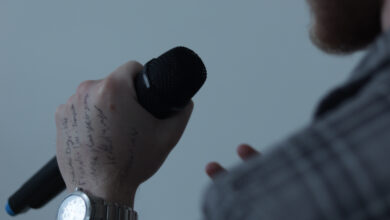Feature: 2024. The Year I Said No To Trauma!
Mike Carter on seeking out theatre with added joy
Theatre has always been lauded as the ultimate reflection of the human soul, capturing our joys, sorrows, and everything in between. But as the curtains rose on 2024, I made a dramatic decision: no more pain, no more angst. Post-COVID, trauma theatre seemed to have become an unstoppable tidal wave. It felt like every fringe production was a somber catalogue of abuse, illness, grief, discrimination, hate, sexual dysfunction, and death.
Sometimes, all of it crammed into one performance.
It’s not that these stories became irrelevant or untrue. Far from it. But to borrow (and twist) a line from the 1976 movie Network: I just reached a point of being “sad as hell and couldn’t take it anymore.”
Beyond my own mental health, I began to worry about artists. 35 years ago, Daniel Day-Lewis dramatically quit Hamlet at the National Theatre after a troublingly out-of-body encounter with the ghost of his long-dead father. Today, that’s not a reason to leave a show, it’s a reason to lean in further. Can you imagine the social media sensation: “Come witness our actor confront his demons – live! Don’t forget to tweet your own dead-dad stories!”
It’s funny. And it’s not.
How did we arrive here? I genuinely suspect a grim connection between the rise of trauma theatre and the woeful inadequacy of mental health support in this country. For many, I am sure that producing a one-person fringe show seems easier than seeking professional help. The waiting lists are certainly shorter and it’s probably cheaper. But the stage is no therapist. Theatre is ruthless. Applause might feel like validation, but it’s fleeting. The reality? For every artist uplifted by their work, countless others are left broken, in a worse place than when they started.
So I opted out. I swore off trauma theatre. My time, my money, my heart would be redirected toward a relentless quest for joy. But make no mistake: joy isn’t frivolous. It isn’t hollow. Rest assured, Mrs. Doubtfire: The Musical remains a crime against everything I hold dear. Yet, if a poster hinted at tragedy, I moved on.
And what did I find? That theatre celebrating friendship, adventure, kindness, and love is every bit as profound as its bleaker counterparts. Laughter reveals the human spirit’s resilience in ways no tortured monologue ever could. Surrealism and absurdity are alive, inclusive, and electrifying. Collaboration shines brighter than any lone voice. And above all, sharing a space doesn’t require bearing your soul; a simple connection transcends angst-ridden spectacle.
Here’s how my trauma-free 2024 unfolded through five Everything Theatre reviewing experiences.
Tongues & Savage/Love at Seven Dials Playhouse
Abstract yet achingly human, this production of the experimental writings of Sam Shepard and Joseph Chaikin bridged life, death, and everything in between. With plotless words, cool music, and transcendent performances, it elevated shared the simple experience of being human without dredging the depths of personal agony. A reminder to theatre-makers: the canon is vast, rich, and brimming with odd, weird, undiscovered texts that can touch audiences without leaving actors needing therapy.
Uncle Vanya at Orange Tree Theatre
Chekhov’s comic masterpiece endures precisely because it resonates universally. Sonya’s final speech – a tender declaration that life is worth the toil – captures the essence of so much trauma theatre but with unmatched elegance. Do I want more Uncle Vanya? Not particularly. But I’d like artists to see it as proof that their pain, while powerful, is rarely uncharted territory. It’s often been said before. It’s often said better.
NonVerbal Theatre of Gesture’s King Lear at Riverside Studios
This minimalist marvel stripped theatre back to its barest essential: movement. There was no narrative, no language, just pure technique. Watching this reminded audiences that skill alone can create great art. The best energies are often from talent and training, not torment. Whatever your craft or discipline, you can make an impact by being really, really good at it.
No Love Songs at Southwark Playhouse
This gig theatre piece was about postnatal depression, so it probably counts as a near-miss. However, the songs were great, the performances electric, and the slightly cheesy happy ending uplifting. It proved that you can tackle traumatic subjects without wallowing in trauma itself. Look up, smile, sing, and crack on; if you can look cool while playing guitar, that’s all the better.
Hansel & Gretel at Shakespeare’s Globe
If No Love Songs was a near miss, the Christmas show at Shakespeare’s Globe was a direct hit. I thought I was safe with a family Christmas show, but no. It tried (and failed) to mash up a kid’s fairy tale with real-world refugee-inspired anguish. My review, a pointed warning to parents, was, I’m afraid, laced with righteous anger. Why can’t we just enjoy ourselves at the theatre?
So, did I miss any groundbreaking theatre by trying to avoid trauma in 2024? No, I don’t think so. Did I have a good time? Absolutely. Most importantly, I felt happier knowing I wasn’t contributing to the myth that all theatre is inherently good for creators and audiences. I wasn’t supporting a misguided model of confessional healing that’s increasingly unhelpful, if not actively dangerous.
So, will 2025 see me returning to angst-ridden torture? Not a chance. So why not join me? Let’s embrace artistry and joy over the year to come.
Want to join Mike on his quest for theatre without the trauma? Or prehaps you want to pick up the shows Mike has decided to give a miss. Either way, we’re always seeking new reviewers to help us cover even more shows. So if you love theatre and love writing, why not get in touch. More information can be found here about writing for ET.







One Comment